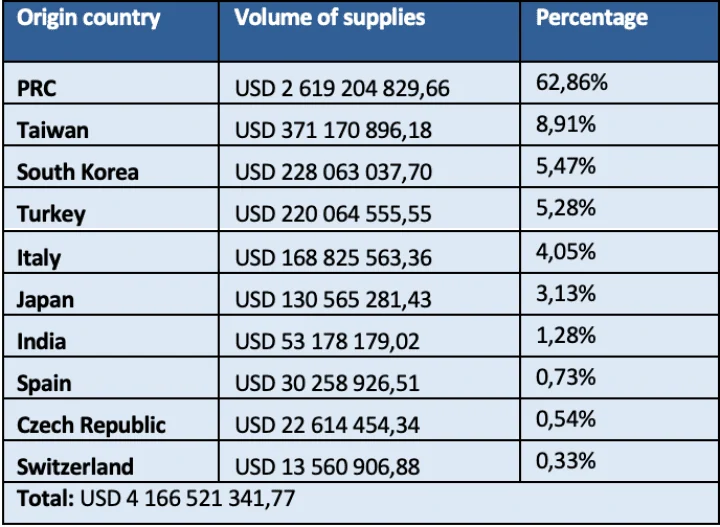Despite heavy international sanctions, Russia has managed to import over 22,000 CNC machines and crucial components, valued at $18.2 billion, from January 2023 to July 2024. These imports are vital for Russia’s defense industry, enabling the production of precise components for modern weapons.
China is Russia’s top supplier, providing 62% of these imports, worth $2.6 billion. Other key suppliers include Taiwan (8.9%), South Korea (5.47%), Italy (4.5%), and Germany (2.8%). Even with sanctions, European manufacturers are still supplying Russia, with Italy sending 4,459 machines worth $168.8 million and Germany sending 2,849 machines valued at $139.9 million.

Additionally, Russia has imported over $14 billion in CNC components and consumables. China remains the leading supplier, with over $7 billion in parts, while European countries like Switzerland and Germany contribute significantly as well.
The European Union has imposed strict sanctions targeting critical technologies, but these are partially ineffective due to loopholes. Subsidiaries of European manufacturers in third countries like China, India, and Malaysia continue to supply Russia with the necessary equipment. This has allowed Russia to sidestep sanctions and maintain access to vital machinery and parts.
CNC machines play a key role in producing high-precision components used in advanced weaponry, including missiles, tanks, and drones. Russia’s ability to manufacture these parts locally reduces dependence on foreign suppliers, boosting its military self-sufficiency.
To improve the effectiveness of sanctions, the international community must close these loopholes. Extending bans to cover subsidiaries in third countries and increasing oversight would help prevent Russia from acquiring these crucial technologies. Holding parent companies accountable for their subsidiaries’ actions can also deter sanction evasion.
The persistent flow of CNC machines to Russia highlights the challenges in enforcing sanctions. It underscores the need for a coordinated global effort to prevent these critical technologies from fueling Russia’s defense industry. Only with a unified approach can the West hope to limit Russia’s military capabilities and hinder its war efforts.
These CNC machines enable the rapid production of high-precision components necessary for defense products. Despite sanctions, Russia has continued importing such equipment and components, with over 22,000 machines arriving between January 2023 and July 2024. China is Russia’s primary supplier, while European countries still contribute significantly, especially Italy and Germany, through intermediaries in third countries.
The reliance on CNC machines is crucial for expanding Russia’s military production. Imports of components alone exceed those of new machines, with China supplying nearly half of these parts. Prior to the Ukraine invasion, Russia relied heavily on foreign CNC imports, with imports covering 70-90% of its needs, and even higher percentages for components.
The EU has intensified sanctions to block Russia’s access to CNC equipment, but these efforts have not fully disrupted the flow due to loopholes. The presence of intermediaries and subsidiaries in third countries complicates enforcement, requiring stricter measures and improved compliance oversight to prevent circumvention.
Russia’s growing dependence on CNC machines and components presents a challenge to sanctions. These machines are essential not only for military production but also for other key industries. Despite continued global demand and technological advancements in CNC systems, Russia’s defense capabilities are bolstered by these imports, making sanctions enforcement more difficult.
As Russia imports more CNC machinery, its military production capacity continues to rise, diminishing reliance on foreign suppliers. This ongoing trend directly challenges Western efforts to weaken Russia’s military infrastructure and limit its ability to wage war.
Moving forward, it’s essential to shift from simply imposing sanctions to ensuring their effective enforcement. Only with coordinated international action, targeted compliance efforts, and strict oversight can the West effectively curtail Russia’s access to technologies that bolster its defense industry.